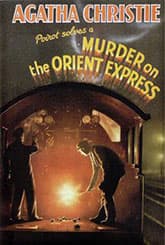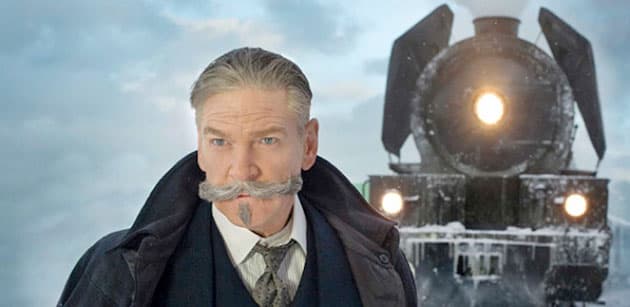Murder on the Orient Express
Critique • Quotes • At the movies
 First edition
First editionAlso known as
Murder in the Calais Coach
First publication
1934
Literature form
Novel
Genres
Crime, mystery
Writing language
English
Author's country
England
Length
Approx. 66,000 words

Kenneth Branagh directs and plays the lead in 2017 adaptation ofMurder on the Orient Express.
Same mystery, different mustache
Murder on the Orient Express (2017): Film, 114 minutes; director Kenneth Branagh; writer Michael Green; featuring Branagh, Tom Bateman, Willem Dafoe, Judi Dench, Johnny Depp, Penélope Cruz, Derek Jacobi, Michelle Pfeiffer
So what are the reasons for making yet another Murder on the Orient Express? Agatha Christie's famous novel had been adapted a handful of times already, including the glamorous 1974 movie production and the deeply felt televised version of 2010.
Was it thought none of the adaptations had yet been faithful enough to Christie's story or characters and this one could redress the problem? But the 2017 film itself departs from the book as much as, if not more than, any of its major predecessors. That is to say, like others, it adheres to the book's overall structure and characters, with a few inconsequential revisions.
Or maybe it was thought this picture could build upon past successes and add something new to the canon. But Kenneth Branagh's film is somewhat short on vision, mainly recycling old Poirot and Orient Express tropes.
Or perhaps the American producers just sensed the the public was ready for a new cinematic presentation of one of the world's best-known murder mysteries, preferably with a lot of star power to light up the big screen. If so, they were right, as evidenced by the sterling box office.
The film directed by and starring Kenneth Branagh—backed with such Hollywood lights as Johnny Depp (as the murdered villain), Willem Dafoe, Penélope Cruz, and Michelle Pfeiffer, and such revered English thespians as Derek Jacobi and Judi Dench (the requisite British Dame in every adaptation of Murder on the Orient Express)—was a monster hit.
The biggest complaint from critics has been that Poirot hogs the limelight, leaving too little for the rest of the huge cast to contribute. Like Albert Finney in the 1974 film, Kenneth Branagh doesn't really look like the supposedly egg-shaped little Belgian of Christie's books. In his case he more closely resembles Buffalo Bill with his Old West-style mustache.
At times Branagh seems to hunch over to make himself look less imposing. He also carries off some of Poirot's irritating habits, to the point of exaggerating his fussy narcissism into a full-blown obsessive-compulsive disorder.
He does however appear nimble enough to pull off some physical stunts that few preceding Poirots would have been able to perform. Though, the setting is the 1930s, much of the the film reveals a more modern sensibility. For one thing, solving the murder is less cerebral and requires multiple action scenes, including fisticuffs, threatened gun play, and hiking across the top of the train.
Trailer for 2017's popular adaptation of Murder on the Orient Express.
The solution comes more raggedly than usual, with several suspects trying to take the blame upon themselves along the way. And in Poirot's final showdown with the suspects, he neither turns over to the group the decision of what to tell the police nor argues the moral issues with them. Rather he resorts to the old unloaded gun trick to settle the matter of whether the suspects are really killers at heart.
And then Poirot is called off to investigate another death, this time on the Nile in an obvious tease for a sequel—a sequel which is assured after audiences found this Poirot mystery so entertaining.
— Eric

